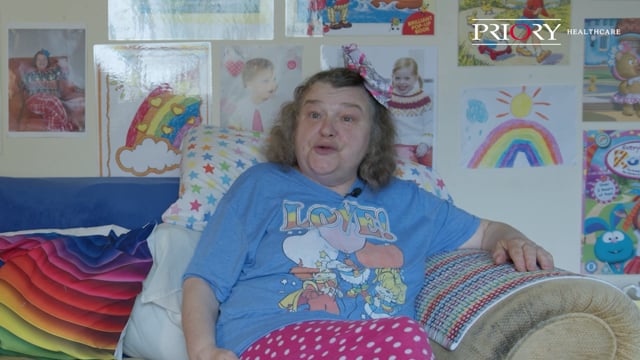About this location
Based in Harleston, Norfolk, Richmond House is a level 2 rehabilitation service for those with a learning disability. We can support adult females with a range of needs, including those who are on the autism spectrum, those with a personality disorders, complex mental health needs, and those with a history of offending behaviours.
We support people to improve their skills and strengthen their independence, enabling safe continuation of care and transition into community placements.
Services at a glance
Contact us
Click here to enable this content
Services
Our comprehensive rehabilitation services provide support for people with complex mental health needs. We align our services with the recommendations of the Joint Commissioning Panel for Mental Health (JCPMH), ensuring our patients are given the highest quality care to enable an appropriate transition back home or into community services, wherever possible.
Ward break down
- 8-bedded house for adult females
Conditions treated
We are able to support people with a learning disability. We can also support people with the following challenges alongside their primary diagnosis:
- Autism
- Personality disorders
- Mental health needs
- Substance misuse
- Physical health conditions
We are able to support patients who are detained under the Mental Health Act (MHA).
Treatment approaches
At Richmond House, we offer an individualised, person-centred approach for all of our patients.
Our main focus is to help people staying with us to maintain their existing skills, whilst developing new ones and building on their strengths. We also focus on symptom reduction – supporting people to reduce self-harm, behaviours that cause clinical distress, and features of mental health conditions and personality disorders.
Our assessment and treatment options are overseen by a full and diverse multidisciplinary team (MDT).
We offer:
- Psychotherapy and counselling
- Cognitive and behavioural therapies
- Dialectical behaviour therapy (DBT)
- Assertiveness training
- Individual cognitive therapy
- Bereavement and supportive intervention
- Sexuality and personal relationships
- Relaxation and anxiety management
- Problem solving
- Life story work
- Substance and alcohol misuse work
- Promotion of healthy lifestyles
- Emotion management work
- Offence specific treatment, for example arson
The assessment and management of risk is seen as an essential component of treatment within our R&R service. Our patients often present with very complex risks and it is important to identify how these might be minimised and managed, not only for the wellbeing of the patient, but also for the benefit of the community. We accept that risks can’t be eliminated completely, but they can be rigorously assessed and managed. Therefore, our MDT reviews risk on a regular basis, as part of our monthly risk formulation meeting. We take a multi-disciplinary approach to risk assessment, validating information where possible and sharing information with others as appropriate, while taking into account the issues of confidentiality. In addition, we believe that patients have a vital role to play in their own risk assessments. This has been demonstrated to make assessment easier, more accurate and can reduce risk.
Our treatment plans adhere to the recovery model, delivered through the care programme approach (CPA).
Length of stay will depend on each individual's required care and treatment needs and progression against their set goals.
Richmond's skills system
We use the DBT-informed ‘skills system’ to help individuals manage difficulties with behavioural and emotional dysregulation. The skills system is a user-friendly set of emotion regulation skills, designed to help people of various ages and abilities, including those with a learning disability, to manage emotions.
The framework helps people experience a dialectical synthesis (the ability to be in pain and be effective at the same time) versus polarisation during emotional, cognitive, behavioural, relationship, and self-processes in complex life contexts.
Our team
- Occupational therapist (OT)
- OT assistant
- Speech and language therapist (SaLT)
- Basic skills teacher
- Clinical psychologist
- Forensic psychologist
- Learning disability and mental health nurses
- Psychiatrists
- GPs
- Hospital director and ward manager
- A practice nurse for physical healthcare
- Patient finance and support
- MHA administrator
- HR support
- Cleaning support staff
- Facilities and maintenance
- Dietitian
- GPs, dentists, opticians and chiropodists, when needed
We also provide specialist staff training, including a thorough induction process, statutory and mandatory training programmes, annual refresher courses, additional rehabilitation training and access to external training. This includes training in positive behaviour support, and working with individuals with a learning disability and/or autism.
Therapeutic and community-based activities
We offer a range of therapeutic and community-based activities as part of a full treatment programme. We want to support people to become more confident and independent, preparing them to move through their treatment pathway towards community living. All patients have a 12-weekly timetable of planned meaningful and therapeutic activity, with a minimum of 25 hours of planned activity. Patients are actively involved in developing and reviewing these timetables and are actively encouraged to participate in the activities offered.
We aim to enable patients to:
- Take a lead role in their activities
- Make informed choices
- Acquire a sense of achievement
- Channel energies appropriately
- Maintain and improve fitness levels
- Extend their range of interests
- Learn new skills
- Access patterns of life that are as normal as possible
- Use community resources appropriately and safely
Our therapeutic and community-based activities include:
- Individual and group sessions
- Education
- Real work opportunities
- Independent living skills
- Community based activities
- Sports and fitness
- Arts and culture
- Gardening
- Animal care
Our facilities and environment
We believe that the environment in which treatment takes place is just as important as the treatment itself, when it comes to supporting our patients. We provide a homely environment, where the people staying with us contribute to the running of the service and take collective responsibility for their behaviours and interactions. We offer a structured and safe environment with clear and consistent boundaries, providing role modelling and regular positive feedback for appropriate behaviour.
We provide:
Our garden offers secure fencing, a patio area with furniture, a lawn, shelter, fixed gym equipment, and planting areas.
Our bedrooms
All of our bedrooms are single-occupancy and patients are encouraged to personalise their bedrooms while they are staying with us. We provide:
Exclusion profile
- People under the age of 18
- Presents an imminent and unmanageable risk to self or others, even with reasonable adjustments
Pathways
Priory’s network of high-quality facilities enables us to offer joined-up care pathways with our dedicated residential services. We offer programmes which integrate healthcare treatment and therapy, which are tailored according to individual needs, in an appropriate setting. Our strength is that we can provide a seamless transition for the individual as they progress between higher and lower dependency services.
We focus on risk reduction to allow for the development of care pathways into less restrictive settings. We work closely with Priory Adult Care services to support people staying with us to move into supported living, wherever possible.
A message from our site leader

The team at Richmond House work with people to deliver an individual treatment plan in a homely and safe environment. We place a big ethos on working with them and their family on understanding what could potentially be a lifelong management plan
Richmond House site leader.
Information for family and friends
How do home visits work?
We help to arrange home visits but we feel this is best arranged after your loved one has had a chance to settle in with us. If it’s felt that the patient is settled and it will be of benefit to the patient and others, then home leave will be considered. When your loved one is ready, home leave is authorised by their responsible clinician who will discuss it with other members of the clinical team and seek any necessary permission, for example, from the Ministry of Justice. Home leave will also depend on which section of the MHA the person is detained under. All local authority and health agencies colleagues involved in your loved one’s care, before admission, will also be notified of any home leave being granted.
What is your visitation policy?
Visits are encouraged and every effort will be made to accommodate visitors. However, it is requested that whenever possible, visits are not made after 7pm. All visits should be arranged in advance, either in writing or by telephone. When visiting for the first time, a staff member will accompany you. This level of supervision may continue on subsequent visits if it is felt to be necessary by the clinical team. All gifts and parcels must be checked by nursing staff before being given to your loved ones. If there are any concerns about any items you wish to bring, please contact a senior member of the nursing staff for a discussion beforehand.
Visitors will be asked to store all their personal belongings in lockers to which they will retain the key. Visits will generally take place in designated visiting areas to protect the privacy of other people staying with us. For those family members who wish to visit their loved one’s own bedroom, arrangements will need to be made in advance, in the interests of personal safety.
It is essential that the privacy of the other people who are staying with us is upheld. Therefore, visits will not be able to take place in communal areas.
Will I be involved and kept up to date with my loved one’s care and wellbeing?
Yes, we make every effort to keep the loved ones of our residents involved in their care. We promote family and friends’ involvement in our care programme approach (CPA). There is also an independent advocacy service for people staying at Richmond House. It is run by POhWER Norfolk and they ensure that people who are staying with us have a chance to have their say.
Will my loved one be able to have a phone or call me?
People staying with us have access to a pay phone, ward telephone and mobile/smart devices. They are encouraged to use all forms of telephone contact outside day activities and session times. A member of the nursing team will help them to use the telephone where necessary. They can also use the ward phone to call solicitors, social workers or other professionals involved in their care. This will happen by arrangement with the nurse in charge.
What type of things are families expected to provide, and what is provided by the home?
On admission, the nurse will complete a list of personal property. This is called an inventory. This list will be kept up to date throughout each person’s stay at Richmond House. All personal belongings are risk assessed before they are allowed to have them in their room. Electrical items will need to be electrically safety tested before they can be used. This also applies to new purchases.
There is a limit to the number of items that can reasonably be stored in a person’s bedroom, due to space considerations. The following list is a guide only:
Entertainment:
- Television and DVD player, Freeview box, stereo
- Games console
- 100 discs (DVDs/CDs/console games)
Clothes:
- 15 pairs of trousers/shorts
- 15 blouses/shirts/t-shirts
- 15 jumpers
- 15 items of underwear
- 15 pairs of socks
- 10 pairs of shoes/slippers/sandals
Ornaments:
- 5 unbreakable ornaments (no glass or china)
- 3 photographs in frames. Any additional photos can be put in an album
- 5 cuddly toys
- 5 books or magazines (no newspapers)
- 1 pot plant
Additional items can be agreed with your loved one’s primary nurse.
What are the bedrooms like?
All of our bedrooms are furnished, and people staying with us are supported to personalise them to suit their needs and wishes. If friends and family wish to provide further items for their loved ones’ bedroom, they will need to be checked with the clinical team. All bedrooms are single person rooms. Each person staying with us will have a key for their bedroom and can use their room outside of day activities and sessions. Locks are fitted to the inside of bedroom doors so that people can lock their doors if they want some privacy. However, staff can override these locks if required, for safety reasons. The nursing staff check on people at least once an hour, or more often if the clinical team states they need to, but they will always knock first before entering the bedrooms.
Are external doors kept locked?
All of our external gates are locked. However, every person staying with us will be individually assessed for any risks to see what security is needed.
What do service users eat and how do meal times work?
Everyone staying with us is able to prepare their own meals.
How does laundry work?
We have laundry facilities on-site so everyone can do their own washing and drying.
Is there anything they can’t bring or have?
There are certain items that are not allowed to be kept by people during their stay. These include:
- Firearms and ammunition
- Weapons
- Alcohol
- Medicines, including over-the-counter and prescribed medicines
- Illicit drugs
- Solvents
- Pornography
- Materials which could incite racial hatred or violence
- Petrol and inflammable liquids, e.g. lighter fuel
- Matches/lighters
- Plastic bags, plastic cutlery and bin liners
- Blu Tack
- Chewing gum
- Digital recorders/video recorders/camcorders
- Fax equipment
- Pets
- Certificate 18 DVDs/videos
- Violent PlayStation and computer games (including Nintendo Wii games)
- Extension leads
- Metal coat hangers
Additional items may be added to this list; please always check with the nursing team when bringing items in, before they are given to the person staying with us.
Are pets allowed?
Unfortunately, live-in pets are not allowed.
How do activities work?
Everyone staying with us is offered a range of activities designed to support them to develop or maintain their individual skills and abilities. We offer the people we support the chance to participate in purposeful, functional activities, where they can achieve personal success and therefore, raise their self-esteem. We also support people to gain more control, take responsibility for themselves and try to promote normal roles and routines within a structured programme, providing opportunities for life change.
Do service users and families have an input into the service user’s care plans?
All of the people staying with us and their families/friends actively involved in care planning, supported by their primary nurse and the wider MDT.
What are the car parking facilities?
There is free car parking on-site.
What is the smoking policy? Can service users buy cigarettes?
Richmond House is a non-smoking site. Smoking or vaping is not allowed.
How is treatment accessed and funded?
We don’t take referrals directly from individuals and families. Instead, the first step will be for you to reach out to the person’s GP so that they can be referred and funded through the correct NHS channel. Depending on the type of support needed, this could include local authority funding, NHS funding, joint funding between the local authority and NHS, or direct payments. Please note, referrals for NHS or local authority funded services must come from a referring organisation.
How to make a referral
Our customer service centre provides 24/7 support for NHS mental health enquiries and referrals. Our customer referral co-ordinators can support you from your first call right through to the enquiry conclusion, providing updates throughout the process. We offer 24/7 crisis referrals, fast access to bed availability and placements, and a single access point for end-to-end enquiry management.















